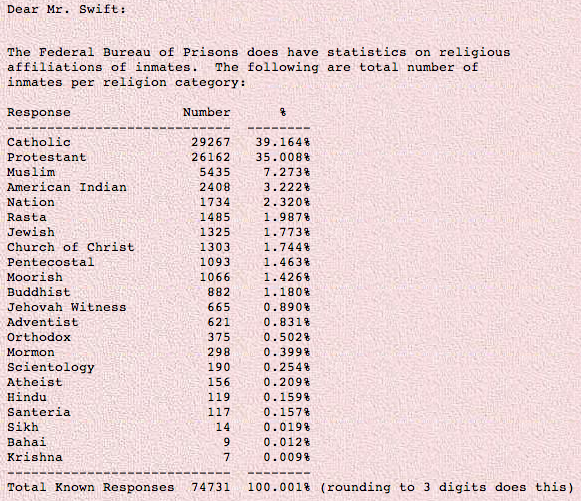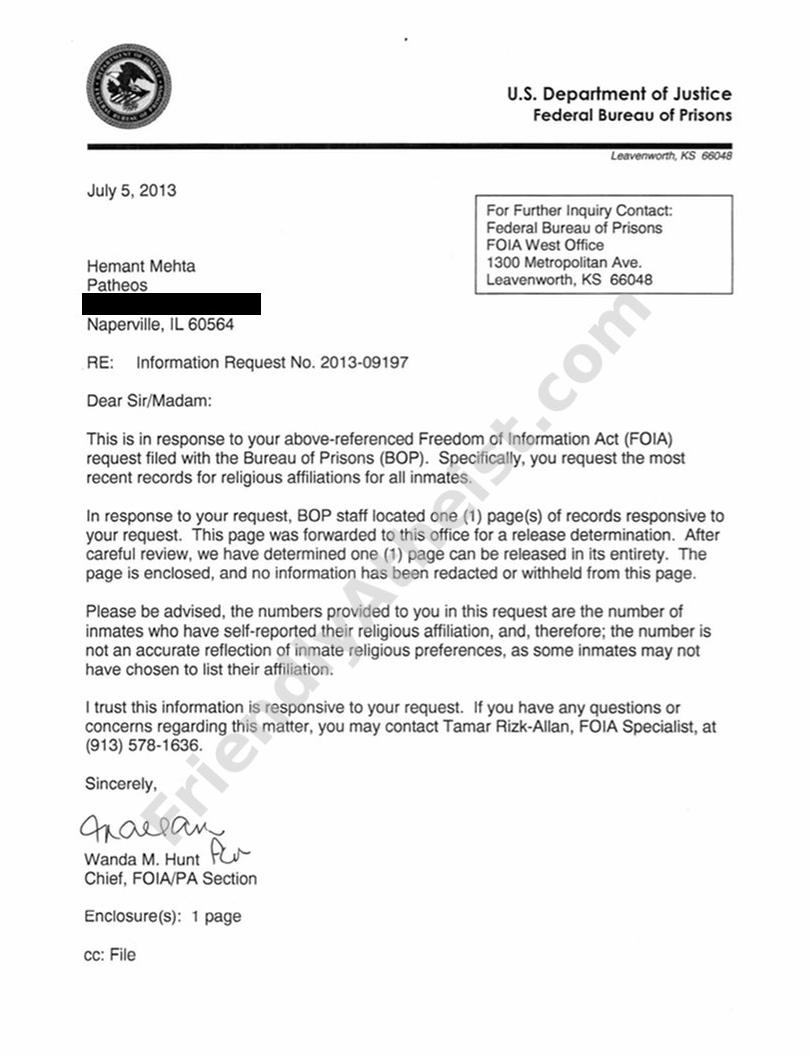What percentage of prisoners are atheists?
This is an important question with serious implications. If the number is high, it lends support to the idea that atheists are immoral (***Edit***: I should’ve made clear that not all prisoners are in jail for immoral reasons, though that is certainly the stereotype). If the number is low, it might provide some proof that, indeed, atheists have their own moral compass that doesn’t involve a holy book.
For more than a decade, if you Googled this question, you were directed to one of two websites, both referring to the same information (though even that’s in dispute) given to a “Rod Swift” by Denise Golumbaski, a research analyst at the Federal Bureau of Prisons. According to them, atheists made up 0.2% of the prison population:

There were always a lot of problems with that information:
- The percentages did not take into account prisoners whose religious affiliations were unknown or who did not respond at all.
- The data in question is more than 15 years old. Whatever it may have represented in the past, it’s practically irrelevant now.
- There’s no link to any official document with this data, only HTML code that has gone unverified for well over a decade.
- The websites talking about this data aren’t unbiased. They’re clearly atheist sites trying to make atheists look good. While numbers don’t lie, without the primary documents, it’s hard to evaluate how objective this information is.
- Golumbaski, the research analyst, no longer works at the Federal Bureau of Prisons… so we couldn’t even confirm that she did this research.
- The Holysmoke.org website this information appears on doesn’t exactly exude credibility.
- It has been said that the U.S. doesn’t even keep any data on the religious beliefs of inmates. Tom Flynn once wrote in Free Inquiry: “… no prison I know of has permitted researchers to catalogue inmates’ religious affiliations. No such data has been kept by any department of corrections — or if kept, no such data has been released.”
Simply put, if a pastor offered this as evidence that Christians were all-but-absent in the U.S. prison system, we’d mock the hell out of them. We’d ask for better evidence. We wouldn’t let them get away with such flimsy data.
So why, as skeptics, do we keep regurgitating this information?
As far as we know, it’s just hearsay. That’s not to say it’s wrong, only that we really don’t have a good reason to believe it other than “this guy on the Internet said so.”
But if you go online, none of that seems to matter. The 0.2% number — based off the Holysmoke.org website — pops up all over the place. Google shows more than 24,000 inbound links to the site. Plus, it seems like whenever an atheist talks about morality, this statistic inevitably comes up.
A few examples:
In a viral 2010 blog post for the Wall Street Journal, Ricky Gervais used the data to support his own atheism:
You see, growing up where I did, mums didn’t hope as high as their kids growing up to be doctors; they just hoped their kids didn’t go to jail. So bring them up believing in God and they’ll be good and law abiding. It’s a perfect system. Well, nearly. 75 percent of Americans are God-fearing Christians; 75 percent of prisoners are God-fearing Christians. 10 percent of Americans are atheists; 0.2 percent of prisoners are atheists.
He repeated it again on Twitter just a couple of months ago:
If all the Atheists & Agnostics left America, they'd lose 93% of The National Academy of Sciences & less than 1% of the prison population.
— Ricky Gervais (@rickygervais) May 1, 2013
In a 2009 paper published by Sociology Compass, researcher Phil Zuckerman of Pitzer College cited the data (and the Adherents website, which links back to the Holysmoke.org site) when explaining how the negative stereotypes people often have of atheists aren’t rooted in reality (PDF):
In many people’s minds — and as expressed so clearly in Psalm 14 cited at the outset of this essay — atheism is equated with lawlessness and wickedness, while religion is equated with morality and law-abiding behavior. Does social science support this position?
…
But when it comes to more serious or violent crimes, such as murder, there is simply no evidence suggesting that atheist and secular people are more likely to commit such crimes than religious people. After all, America’s bulging prisons are not full of atheists; according to Golumbaski (1997), only 0.2 percent of prisoners in the USA are atheists — a major underrepresentation.
The 0.2% number has also been cited in book after book after book — including Victor Stenger‘s New York Times bestseller — and op-ed pieces, all referencing the exact same data.
If the statistic is wrong, we must stop using it. But can we really confirm or deny this information?
Yes we can — and I finally have some definitive information to back it up.
…
Earlier this month, I filed a Freedom of Information Act request with the Federal Bureau of Prisons asking them about the religious makeup of prisoners. Over the weekend, to my surprise, I received a response. Not only did they have the information, they gave me a faith-by-faith breakdown:


So… what do we learn from that information?
Of the prisoners willing to give their religious affiliations (and that’s an important caveat), atheists make up 0.07% of the prison population.
Not 1%.
Not even the 0.2% we’ve been using for so long.
Atheists constitute an even smaller percentage of the prison population than we ever imagined. (That includes prisoners whose affiliations were unknown. If I used Golumbaski’s method, the number would be 0.09%.)
In addition to that, Protestants make up 28.7% of the prison population; Catholics, 24%; Muslims, 5.5%; American Indians, 3.1%. I’ve put together a bare-bones spreadsheet with these numbers here — feel free to do with that what you will.
Keep in mind that these numbers only cover prisoners who self-reported their religious identification. They don’t represent all prisoners in the system. We will likely never have perfect numbers… but neither did Rod Swift.
We’re also only talking about prisoners in the federal prison system — about 218,000 people — not all prisoners in America.
Prisoners can change religious affiliations, too. We don’t know if these numbers represent what they believed when they committed their crime(s) or what they believed after they went through some personal transformation.
Finally, it’s also important to note that 17% of prisoners reported no religious preference. They’re not necessarily atheists and may even believe in a higher power. We really don’t know. 3% were “Other” and 3.44% were “Unknown.” We can’t assume these people are atheists or Christian or anything else. However, if you combined the Atheist/No Religious Preference groups and lumped them together as “Nones,” as some sociologists do, you’d get 17% of the prison population… I’m not sure that tells you anything useful, though, because of the murkiness of the labels.
…
When you look at Swift’s numbers from 1997 and the information here, there are some rough similarities. Yes, the raw numbers are different (we have a lot more prisoners now!) and some of the proportions have changed, but it seems very plausible to me that Swift really was given that data by Golumbaski.
Were we wrong to quote the 0.2% number for this long? Not necessarily… but I still don’t believe we had a good foundation for that. Using a shoddy website with no verifiable information as the basis for a claim we make is the type of thing we expect from religious people. We must be better than that.
Here’s another question worth asking: How does the prisoner data compare to the religious makeup of the general population? In other words, are atheists over-presented or under-represented in prison?
If you look at the Pew Forum on Religion & Public Life’s 2008 U.S. Religious Landscape Survey (PDF), you’ll see that self-described atheists make up 1.6% of the population. The 2008 American Religious Identification Survey (PDF) puts atheists at 0.7% of the population. (If those numbers seem awfully low to you, make sure you’re not confusing atheists with the ever-rising percentage of “Nones.”)
In both cases, atheists are *very* under-represented in prison and that’s heartening to see. (The proportion of Catholics in prison is about on par with their makeup in the general population, Muslims are over-represented in prison, and Protestants appear to be under-represented though you really have to look at individual denominations to get a clearer picture of what’s happening.)
Given the data we have, and acknowledging its limits, self-professed atheists constitute an even smaller percentage of prisoners than we ever thought.
…
For what it’s worth, I tried to get in touch with Golumbaski, the research analyst at the Federal Bureau of Prisons whose response to Swift gave us the oft-cited 0.2% number. I wanted to confirm that she actually worked at the FBP and that Swift’s information represented research she had done. While it appears she did work with the FBP at one point (she was mentioned in a 1997 paper put out by them, though the paper makes no reference to prisoners’ religious beliefs), she now works at a private law firm. I left her a message, but have not heard back.



It’s Moving Day for the Friendly ..."
It’s Moving Day for the Friendly ..."
It’s Moving Day for the Friendly ..."
It’s Moving Day for the Friendly ..."